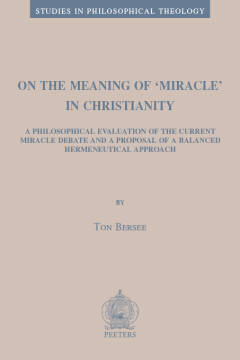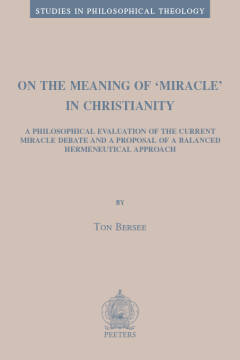
- Afhalen na 1 uur in een winkel met voorraad
- Gratis thuislevering in België vanaf € 30
- Ruim aanbod met 7 miljoen producten
- Afhalen na 1 uur in een winkel met voorraad
- Gratis thuislevering in België vanaf € 30
- Ruim aanbod met 7 miljoen producten
Zoeken
On the Meaning of 'Miracle' in Christianity
A Philosophical Evaluation of the Current Miracle Debate and a Proposal of a Balanced Hermeneutical Approach
T Bersee
€ 144,45
+ 288 punten
Omschrijving
Miracle narratives are an essential part of nearly all religious traditions. The importance of miracles also applies to Christianity. The Gospels record thirty-five miracles that Jesus is said to have performed, including twenty-three miraculous healings and nine nature miracles (for example, stilling a storm and turning water into wine). At the heart of Christian faith lies the story of Jesus' resurrection from the dead. However, the factuality of these events has been increasingly problematised, especially since the period of the Enlightenment. In this study, it is argued that the current debate between science-oriented critics of miracles and their religious opponents focuses predominantly on the question of factuality and evidence at the loss of the religious meaning of miracles. The suggestion that science and religion would be opposite approaches is denied in a proposal of a balanced hermeneutical approach of miracles that does justice to scientific findings, religious texts and experience.
Specificaties
Betrokkenen
- Auteur(s):
- Uitgeverij:
Inhoud
- Aantal bladzijden:
- 268
- Taal:
- Engels
- Reeks:
- Reeksnummer:
- nr. 68
Eigenschappen
- Productcode (EAN):
- 9789042943957
- Verschijningsdatum:
- 4/02/2021
- Uitvoering:
- Paperback
- Formaat:
- Trade paperback (VS)
- Gewicht:
- 194 g

Alleen bij Standaard Boekhandel
+ 288 punten op je klantenkaart van Standaard Boekhandel
Beoordelingen
We publiceren alleen reviews die voldoen aan de voorwaarden voor reviews. Bekijk onze voorwaarden voor reviews.








